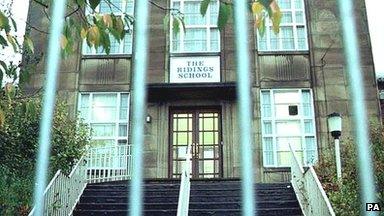How does a failing institution shake its reputation?
- Published

Birmingham City Council has struggled to attract the best social workers because "it's a blot on their CV", the head of the authority's children's service recently said. So how does a failing institution turn itself around when it is blighted by its own reputation?
After a series of "preventable" deaths and repeated 'inadequate' ratings from Ofsted, Birmingham's children's service has acquired a failing reputation it is keen to shake.
On Thursday, the authority announced its plan to improve the department, with an injection of millions of pounds of extra funding and a new strategy - to make different agencies work more efficiently together and to attract the best social workers.
But attracting the best workers is easier said than done. Vacancy rates for full-time social workers at the authority are currently at more than a fifth.
After the council was warned in November children's services could be taken over by the Department for Education, the department's head Peter Hay told BBC Radio 4's Today programme: "I've heard people thinking about jobs say that they've been told not to come to Birmingham because it's a blot on their CV.
"I think that's unacceptable."

The Ridings School in Halifax was closed in 2009
But is the city council fighting a losing battle?
Tim Ambler, a senior fellow at the London Business School - and one of England's leading branding and marketing experts - believes a reputation can be a huge obstacle when it comes to turning fortunes around.
"It's a bit like inviting soldiers to join a losing general - you don't want to fight with someone who is going to lose the war," he said.
But the dilemma is not unique to Birmingham.
In Halifax, a community hub has been created on what was once dubbed the worst school in Britain.
But the project to transform the former Ridings School has not been easy.
Colin Davies, the chief executive of not-for-profit organisation Threeways, which took over the site in June, said he had encountered problems attracting funding and volunteers - partly because of the site's reputation.
"There has been a reluctance for people to come forward and get involved," he said.
"They are looking at the project with a degree of cynicism.
"One person made a comment shortly after we launched saying, 'I give it three months and the place will be burnt to the ground'."
Meanwhile in Hull, city councillors are basking in the glory of being named the UK City of Culture 2017.
But in 2005, Channel 4 show The Best and Worst Places to Live in the UK branded it the worst, external place to live and, Lord Mayor Nadine Fudge said, following that, the city struggled to attract businesses and tourists.
"We were all blazing about it when it happened," she said.
"I can't remember any big companies moving to Hull at that time."
But she said since the City of Culture announcement, there had been "a number of inquiries" from major firms hoping to set up in Hull. She also said the council had received calls from other authorities wanting advice about how they could achieve the accolade themselves in the future.

Hull, home to the Maritime Museum, was branded the worst place to live in 2005
The Healthcare Commission voted Ealing Hospital NHS Trust worst in the country for care, external in 2008 but trust bosses refused to comment when the BBC asked what the impact of that label had been.
Some failing institutions have taken extreme measures to disassociate themselves with a name.
Earlier this year, administrators recommended Mid Staffordshire NHS Trust should be dissolved after The Francis Inquiry highlighted "appalling and unnecessary suffering of hundreds of people" at Stafford Hospital.
The inquiry found some patients had been left lying in their own faeces for days and given the wrong medication.
'Constantly criticised'
Heather Gough, who has been a nurse at Stafford Hospital more than 40 years, said there was a stigma about working at the hospital in the aftermath of the inquiry. She said a number of workers left and a number of others threatened to leave.
"People were concerned about having Stafford Hospital on their CV," said the 57-year-old.
"If I had been working somewhere else, I would not have thought twice about going for a job at Stafford at that time.
"It's a difficult environment to work in when you're constantly being criticised.
"No-one wanted to be tainted by that."
Defra replaced the discredited Ministry of Agriculture, Fisheries and Food, external in 2001 following heavy criticism of the government's handling of the foot-and-mouth crisis.
And the Labour Party coined New Labour in the 1990s in a bid to convince the public it understood the importance of financial prudence and the party had learnt from past mistakes.

Bharat Chauhan said fewer social worker postgraduates from Birmingham City University were getting jobs in the city
Speaking on Thursday, Mr Hay said his children's services department had to "shift that stigma and convince social workers Birmingham is a great place to be".
But Mr Ambler said a rebranding exercise often just covered the cracks. He said the best way to turn around a reputation was to ensure an institution had real authority.
"Reputation is the symptom - not the problem," he said.
"If you cover the reputation all you are doing is covering over the problems."
He said in the case of Birmingham, the children's department needed a clear, accountable leadership at case level as well as at the top.
"Turning it over to government would have been a stupid idea," he said.
"Under Hay, they have someone who has the charisma to persuade people in Birmingham he can solve the problem."
Meanwhile Bharat Chauhan, head of social work at Birmingham City University, said in order to attract the best candidates the council needed to stress it had managers in place to support them.
He also said it needed to show there was scope for career progression in Birmingham and opportunity for postgraduates to develop their skills.
He denied there was a stigma associated with working for the city council.
On the contrary, postgraduates want to be employed in Birmingham because it boosts their CV, he said.
"It has a reputation for being a very challenging place to work," he said.
"If you can serve there you can serve anywhere."
- Published3 October 2013

- Published29 November 2013

- Published14 November 2013

- Published12 November 2013

- Published15 October 2013

- Published4 October 2013
